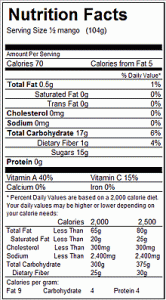Mango | Mango Health Benefits

Mango is the “king of fruits” and is the National Fruit of India. Mangoes have been cultivated in India since 25-30 million years ago.
In Hindu, beliefs mango symbolize life and is used in almost every sacred ritual. There is a custom of using mango leaves for decoration in all festivals and weddings and got a coveted place in Hindu religious scriptures.
Mango is native to India and much grown in Southeast Asia. The popularity of mango is in all historical scripts and is the most loving fruit in India. They need a warmer climate which is found in Asia and is also grown in Mexico, Brazil, and the West Indies.
Nutrition facts of Mango
Mango is a low-calorie fruit that is high in dietary fiber, Vitamin B6, and very low in saturated fat, cholesterol, and sodium. It’s a great source of Vitamin A and C and contains folate, B6, iron, and a little calcium, zinc, and vitamin E.
They are a good source of antioxidants, containing certain phytochemicals such as gallotannins and mangiferin, and are very rich in minerals like potassium, magnesium, and copper.

In addition, mango being sumptuous, luscious, sweet, and refreshing it got many nutritional benefits too. Here are ten health benefits mango provides.

1. Helps in digestion
Mangoes help in healthy digestion, it contains dietary pectin which helps in digestion. Mangoes contain digestive enzymes which aid in the digestion of protein and fat efficiently and eliminate the problem of indigestion and acidity.
2. Boost immunity
Mango has an impressive vitamin content that assures overall health. Vitamin A a nutrient essential for the proper functioning of the immune system is found in vitamin powerhouses Mango.
3. Weight Loss
The phytochemicals in the mango skin act as natural fat busters. The mango flesh is filled with dietary fibers which induce a feeling of satiety and you tend to feel full for long and tend to eat less fattening snacks.
4. Skin and hair health
Mango is high in vitamin C, which promotes healthy hair and skin. Vitamin A in mango also helps in the maintenance of epithelial tissues, including skin, hair, and sebaceous glands.
5. Cure Acne
Vitamin C and vitamin A in mangoes are strong antioxidants that help in curing acne and pimples. Vitamin A is your skin’s best friend and its deficiency can lead to dull skin, open pores, eruptions on the arms and elbows.
6. Promote Brain Health
Mango contains an abundant amount of vitamin B6, which helps in improving brain function and maintaining an efficient nervous system. It also enhances your mood by controlling stress and is known as an energy builder.
Glutamine acid, present in mango, improves memory and concentration. Pyridoxine helps in the production of Gamma-Amino Butyric acid or GABA hormone in the brain.
7. Manage Diabetes
Mango is slowly gaining new acclaim as a diabetes fighter. It was a long-told myth that diabetics should avoid mango because of its sweet taste. The glycemic index of mangoes ranges between 41 to 60, with an average of 51. The value of 51 is on the lower end of the glycemic index scale. Foods that are less than 55 are considered to be low glycemic food, which is safe for diabetics to consume. Not only the fruit the leaves also fight against diabetes.
8. Eye health
The high amount of vitamin A as well as flavonoids like beta-carotene, alpha-carotene, and beta-cryptoxanthin present in mangoes improves vision, fights dry eyes, and prevents night blindness.
9. May protect against cancer
The fruit packs over a dozen types of polyphenols. Mangoes also contain quercetin, mangiferin, and norathyriol, which are all potential antioxidant compounds. Antioxidants help protect your body’s cells from damage from free radicals (which experts believe cause cancer, atherosclerosis, and other diseases).
10. Support Healthy Heart
Mango contains nutrients that support a healthy heart. Fresh mango is a good source of potassium, which is an important component of cells and body fluids. Potassium helps control heart rate, blood pressure and prevents cardiovascular diseases
Note that it also contains urushiol, the same compound that causes reactions to poison ivy, so if you’re sensitive be cautious about consuming mango skin.
Disclaimer: The article is just for informational purpose. And all information facts are personal opinion of the author.






